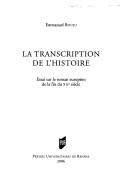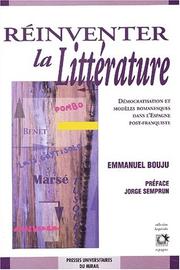| Listing 1 - 10 of 26 | << page >> |
Sort by
|
Book
ISBN: 9782350183718 2350183718 Year: 2015 Publisher: Nantes: Defaut,
Abstract | Keywords | Export | Availability | Bookmark
 Loading...
Loading...Choose an application
- Reference Manager
- EndNote
- RefWorks (Direct export to RefWorks)
Ce volume a pour origine le projet de réunir une série d'articles inspirés des conférences prononcées par des chercheurs renommés dans le cadre d'un cycle intitulé "Représentation de la littérature : vocabulaires et modèles". Chaque auteur propose des pistes inédites de réflexion en matière de théorie de la littérature, à partir du choix d'un élément de vocabulaire, éprouvé ou inventé. Les fragments d'un discours théorique cherche à exposer de façon neuve ce que la littérature offre, en propre et en commun, à notre horizon de pensée.
Literature --- History and criticism&delete& --- Theory, etc --- Aesthetics --- Literature History and criticism --- History and criticism --- Theory, etc. --- Théorie littéraire --- Littérature --- Théorie du texte --- Littérature --- Esthétique --- Histoire et critique --- Théorie, etc. --- Meaning-text theory (Linguistics) --- Philosophy.
Book
ISBN: 3031099249 3031099230 Year: 2023 Publisher: Cham : Springer International Publishing : Imprint: Palgrave Macmillan,
Abstract | Keywords | Export | Availability | Bookmark
 Loading...
Loading...Choose an application
- Reference Manager
- EndNote
- RefWorks (Direct export to RefWorks)
“After postmodernism’s literature of exhaustion, Emmanuel Bouju asks what new life the novel can breathe into the present. Building on Kafka and Calvino, Walter Benjamin and Gilles Deleuze, Bouju ranges freely among a host of contemporary writers, probing their complex revitalization of modernist themes and tropes in ‘a new consistency of literary and artistic discontinuity.’ At once intense and playful, Epimodernism breathes new life into narrative studies today.” —David Damrosch, Ernest Bernbaum Professor of Comparative Literature, Harvard University “‘Epi’” – a prefix denoting surface, as well as ‘with’ and ‘among’ – is mobilized here in bold and interesting ways for a vocabulary of literary criticism that skirts the tired ‘isms’ and ‘posts’ of late capitalism’s unraveling. A true comparatist, Bouju offers six ‘memos,’ each describing a literary epiphenomenon in its travels across multiple languages, traditions and cultural sites. From the sound-values of Kafka’s ‘K,’ which rewrite ‘Amerika’ the world over, to phantom pains and mirror-boxes conserving distant wartime memories, to genetic crossings of biofiction and autofiction, to the crypto-currencies and autopilots of contemporary metanarratives, Epimodernism investigates the byways of aesthetic microworlds hitherto unknown and unauthorized.” —Emily Apter, Silver Professor of French and Comparative Literature, New York University' Postmodernism has had its day. Are we now in the era of epimodernism? Reinterpreting the six “memos” that Italo Calvino suggested more than thirty years ago for “the new Millennium”, in this acclaimed book Emmanuel Bouju identifies six new values for literature in the twenty-first century: Superficiality, Secrecy, Energy, Acceleration, Credit, and Follow Through. Based on the principal meanings of the Ancient Greek prefix epi – surface, contact, origin, extension, duration, authority, and finality – these values represent six different ways of relating to the legacy of modernist utopias, reorienting postmodern critique and rebooting, with all due irony, its various forms of engagement and empowerment. Equal parts cultural criticism and literary creation, this highly original essay both enacts and explores the epimodern turn in contemporary European literature. Rigorous and humorous, provocative and playful, Epimodernism helps us to understand what literature can describe, imagine, and invent in our challenging times. Emmanuel Bouju is Professor of Comparative Literature at Paris 3 La Sorbonne Nouvelle, and a Senior Member of the Institut Universitaire de France.
Literature—Philosophy. --- Postmodernism. --- Literature, Modern—20th century. --- Literature, Modern—21st century. --- Literary Theory. --- Post-Modern Philosophy. --- Contemporary Literature. --- Post-modernism --- Postmodernism (Philosophy) --- Arts, Modern --- Avant-garde (Aesthetics) --- Modernism (Art) --- Philosophy, Modern --- Post-postmodernism

ISBN: 9782753502130 Year: 2006 Publisher: Rennes : Presses universitaires de Rennes,
Abstract | Keywords | Export | Availability | Bookmark
 Loading...
Loading...Choose an application
- Reference Manager
- EndNote
- RefWorks (Direct export to RefWorks)
Histoire (discipline) --- Roman européen --- Dans la littérature. --- Histoire et critique. --- European fiction --- European fiction. --- Histoire --- Histoire. --- Roman européen. --- Thème littéraire. --- histoire --- roman historique européen --- History and criticism --- Histoire et critique --- Littérature européenne --- 1900-1999. --- 20e siècle.
Book
Year: 1997 Publisher: Paris: Didier,
Abstract | Keywords | Export | Availability | Bookmark
 Loading...
Loading...Choose an application
- Reference Manager
- EndNote
- RefWorks (Direct export to RefWorks)
Book
Year: 1997 Publisher: Paris: Didier,
Abstract | Keywords | Export | Availability | Bookmark
 Loading...
Loading...Choose an application
- Reference Manager
- EndNote
- RefWorks (Direct export to RefWorks)
Multi
ISBN: 9783031099243 9783031099236 9783031099250 9783031099267 3031099249 Year: 2023 Publisher: Cham : Springer International Publishing : Imprint: Palgrave Macmillan,
Abstract | Keywords | Export | Availability | Bookmark
 Loading...
Loading...Choose an application
- Reference Manager
- EndNote
- RefWorks (Direct export to RefWorks)
"After postmodernism's literature of exhaustion, Emmanuel Bouju asks what new life the novel can breathe into the present. Building on Kafka and Calvino, Walter Benjamin and Gilles Deleuze, Bouju ranges freely among a host of contemporary writers, probing their complex revitalization of modernist themes and tropes in 'a new consistency of literary and artistic discontinuity.' At once intense and playful, Epimodernism breathes new life into narrative studies today." -David Damrosch, Ernest Bernbaum Professor of Comparative Literature, Harvard University "'Epi'" - a prefix denoting surface, as well as 'with' and 'among' - is mobilized here in bold and interesting ways for a vocabulary of literary criticism that skirts the tired 'isms' and 'posts' of late capitalism's unraveling. A true comparatist, Bouju offers six 'memos,' each describing a literary epiphenomenon in its travels across multiple languages, traditions and cultural sites. Fromthe sound-values of Kafka's 'K,' which rewrite 'Amerika' the world over, to phantom pains and mirror-boxes conserving distant wartime memories, to genetic crossings of biofiction and autofiction, to the crypto-currencies and autopilots of contemporary metanarratives, Epimodernism investigates the byways of aesthetic microworlds hitherto unknown and unauthorized." -Emily Apter, Silver Professor of French and Comparative Literature, New York University' Postmodernism has had its day. Are we now in the era of epimodernism? Reinterpreting the six "memos" that Italo Calvino suggested more than thirty years ago for "the new Millennium", in this acclaimed book Emmanuel Bouju identifies six new values for literature in the twenty-first century: Superficiality, Secrecy, Energy, Acceleration, Credit, and Follow Through. Based on the principal meanings of the Ancient Greek prefix epi - surface, contact, origin, extension, duration, authority, and finality - these values represent six different ways of relating to the legacy of modernist utopias, reorienting postmodern critique and rebooting, with all due irony, its various forms of engagement and empowerment. Equal parts cultural criticism and literary creation, this highly original essay both enacts and explores the epimodern turn in contemporary European literature. Rigorous and humorous, provocative and playful, Epimodernism helps us to understand what literature can describe, imagine, and invent in our challenging times. Emmanuel Bouju is Professor of Comparative Literature at Paris 3 La Sorbonne Nouvelle, and a Senior Member of the Institut Universitaire de France.
Philosophy --- Linguistics --- Literature --- geletterdheid --- filosofie --- literatuur --- postmodernisme (filosofie) --- anno 1900-1999 --- Postmodernism. --- Literature, Modern --- Literary Theory. --- Post-Modern Philosophy. --- Contemporary Literature. --- Philosophy.

ISBN: 2753502137 Year: 2006 Publisher: Rennes : Presses universitaires de Rennes,
Abstract | Keywords | Export | Availability | Bookmark
 Loading...
Loading...Choose an application
- Reference Manager
- EndNote
- RefWorks (Direct export to RefWorks)
European fiction --- Literature and history --- Roman européen --- Littérature et histoire --- History and criticism --- Histoire et critique
Book
Year: 1997 Publisher: Paris Didier Erudition
Abstract | Keywords | Export | Availability | Bookmark
 Loading...
Loading...Choose an application
- Reference Manager
- EndNote
- RefWorks (Direct export to RefWorks)

ISBN: 2858166005 Year: 2002 Publisher: Toulouse : Presses universitaires du Mirail,
Abstract | Keywords | Export | Availability | Bookmark
 Loading...
Loading...Choose an application
- Reference Manager
- EndNote
- RefWorks (Direct export to RefWorks)
Book
ISBN: 9782867818257 Year: 2012 Publisher: Bordeaux Presses universitaires de Bordeaux
Abstract | Keywords | Export | Availability | Bookmark
 Loading...
Loading...Choose an application
- Reference Manager
- EndNote
- RefWorks (Direct export to RefWorks)
| Listing 1 - 10 of 26 | << page >> |
Sort by
|

 Search
Search Feedback
Feedback About UniCat
About UniCat  Help
Help News
News